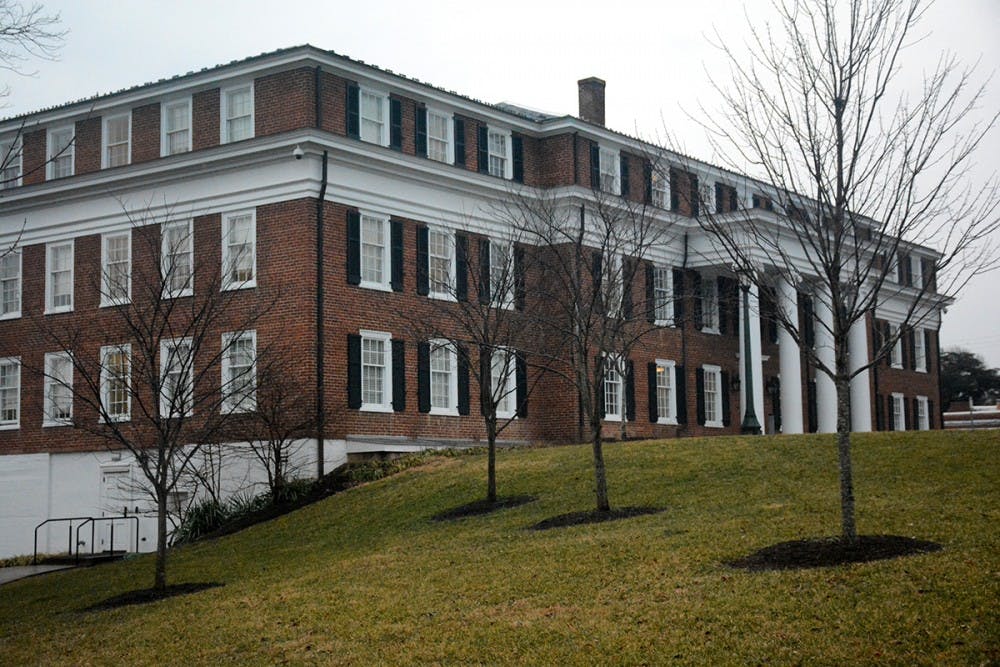The Title IX Office at the University offers a lot of support for survivors of sexual assault, however, the location of the Title IX Office poses obstacles of accessibility for survivors. The Title IX Office is located in O’Neil Hall, which is situated away from Central Grounds, past Beta Bridge on Rugby Road. The Title IX Office is a subsection of the University’s Office for Equal Opportunity and Civil Rights. While the main office location for the EOCR is in Hotel B on the East Range, survivors often make the walk down Rugby Road to the Title IX Office in O’Neil Hall to meet with their caseworker, attend hearings and submit testimony. Not only are the offices geographically distant from Central Grounds, it is also surrounded by fraternity houses and off-Grounds housing. The location of the Title IX Office on Rugby Road presents physical and emotional barriers to reporting sexual assault for survivors.
Considering the majority of sexual assaults go unreported, the University should factor in the possibility that the Title IX Office’s geographical location on Rugby Road may significantly contribute to this reality. According to the National Sexual Violence Resource Center, sexual assault is the most under-reported crime with 63 percent of sexual assaults not reported to law enforcement. If a survivor at the University chooses to report his or her assault, the barriers to physically arrive at the Title IX Office are numerous. Students, especially those in first-year dorms, may have to walk a great distance or rely on the sometimes unpredictable transit schedule to get to O’Neil Hall. While students can utilize the online Just Report It system to initially submit their incident of sexual assault, most meetings and elements of the reporting process take place in O’Neil Hall. Unfortunately, the location of the Title IX Office is just the beginning of the barriers survivors face in the reporting process.
The NSVRC estimates “20-25 percent of college women and 15 percent of college men are victims of forced sex during their time in college.” After reporting their assault, survivors face numerous barriers within the legal system that deter victims from reporting their assaults — many survivors fear retaliation, while others worry about doubt from law enforcement. With the proposed changes to Title IX by Secretary of Education Betsy DeVos, the reporting process at colleges and universities may become even more difficult for survivors. Under the new policies, colleges and universities could select to raise the standard of proof for sexual assault cases from “preponderance of evidence” to “clear and convincing evidence.” These proposed changes will create additional barriers for survivors to report sexual assaults, putting even more of an onus on the University to make the reporting process more accessible and manageable for students.
The distant location of the Title IX Office adjacent to the fraternity houses on Rugby Road presents potential emotional obstacles for survivors of sexual assault. To report their case in-person, meet with advisors from the Title IX Office and attend hearings for their case, survivors are forced to walk down Rugby Road, passing fraternity houses and off-grounds residences. While not all assaults take place in these areas, the Greek system is no stranger to large parties with obscene amounts of alcohol. Many studies cite alcohol use, the Greek system and off-campus parties as factors which increase the chance of sexual assault. At the University, these elements are often found in the Rugby Road corridor. Furthermore, the 2017 Campus Climate Survey on Sexual Assault and Sexual Misconduct found that 12.7 percent of assaults by force and 25.5 percent of assaults by incapacitation at the University take place in fraternity or sorority houses. And 55.9 percent of assaults by force and 34.9 percent of assaults by incapacitation occur in off-Grounds housing. It is unreasonable to ask survivors to make the trek off-Grounds, down Rugby Road — past where their assault likely took place — to O’Neil Hall to complete aspects of the Title IX process.
The Title IX Office is designed to provide services and support to individuals during difficult times. Seeing as there are already multiple barriers to reporting sexual assaults, the University should recognize that the location of the Title IX Office does nothing to aid survivors. By moving the Title IX Office to a central location on Grounds, then one of the many burdens of reporting sexual assaults will be removed from survivors. Survivors will not have to move outside of their daily routines to make the trip down Rugby Road to O’Neil Hall. And perhaps, a central location may even encourage more survivors to report their assaults. Moving the Title IX Office away from Rugby Road and onto Central Grounds will empower survivors and remove obstacles to the reporting process of sexual assaults at the University.
Mary Alice Kukoski is an Opinion Columnist for The Cavalier Daily. She can be reached at opinion@cavalierdaily.com.






